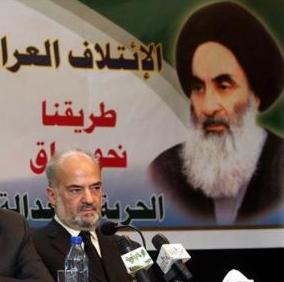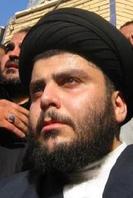Jaafari Prime Minister 2006-2010
But is not Allowed on US Television
Breaking news: The United Iraqi Alliance, a coalition of Shiite fundamentalist parties, has chosen Ibrahim Jaafari to be prime minister of Iraq for the next four years. The UIA had hoped to avoid going to an up and down vote, but was forced into one on Sunday when it was unable to decide by consensus. Jaafari of the Dawa Party got 64 votes, while his rival, Adil Abdul Mahdi of the Supreme Council for Islamic Revolution in Iraq, received 63.
Jaafari
The UIA has 128 seats in parliament, so presumably someone abstained or was absent, otherwise it would have been a tie or Jaafari would have won by a two-vote margin. Jaafari won in large part because of the backing of Muqtada al-Sadr’s bloc, which is larger than that of the Dawa Party’s two factions. The narrowness of Jaafari’s victory weakens him, his coalition, and the new Iraqi government.
Muqtada al-Sadr
I scanned the US cable news channels and only CNN Headline News was making much of this development, and then only briefly. It raises the question for me of whether US television news has unspoken racist undertones. There are exceptions. Wolf Blitzer’s Sunday show on CNN, actually allows real live Middle Easterners to speak to the US public. Fine reporters such as Nic Roberts at CNN will set up brief clips of a Jaafari press conference or a short Q & A on a particular issue with an Iraqi official. But on the hour-long t.v. news magazines, or even just with the anchors during the day, we never see so much as an extended interview with Ibrahim Jaafari. Isn’t that weird? The real UK BBC will do an hour-long interview with an Iraqi cabinet minister like Ali Allawi. But our television news almost never talks to anyone among important Iraqi politicians, with the possible exception of the Kurdish politician Jalal Talabani, the mostly ceremonial president of Iraq. Aren’t the Iraqi politicians who have come to power in the celebrated purple-thumb Iraqi elections worth talking to? Don’t Americans care what they think? Or are they just a blank set of canvases on which Kansas gets to paint its own preconceptions and prejudices (a process made all the easier if real Iraqis are not allowed to speak on camera to Americans)? And, with all these cable channels and satellite capabilities, why can’t we see the real BBC in America? I mean, I can watch French and Italian and Egyptian and Lebanese channels. I’m not even being offered by my satellite company the possibility of the real BBC. Isn’t that weird? There are so many weird things. The upshot is that if you don’t have Joe Scarborough’s profile, you don’t get seen or heard much on US television.
In contrast, the much-maligned (in the US) Aljazeerah just had an excellent wide-ranging 45-minute discussion of Jaafari’s election with several Iraqi observers of different persuasions. Can’t we here expect to be at least as well served by our television news as the Arab world is by theirs?
Back to Iraq. Jaafari is disliked by the Kurdistan Alliance, with which he will have to form a coalition in order to have the president chosen. Jaafari’s backers, the Sadrists have declared a “red line” in that they will not entertain a cabinet post for secular ex-Baathist Iyad Allawi, whose list fared poorly in the elections, but who is backed by the Americans and has old links to the Kurds. Aljazeera says that Jalal Talabani, a key member of the Kurdistan Alliance, is saying he draws a red line against red lines. I.e., he will not back down on the Allawi issue just because the Sadrists have taken a stand. But Jaafari owes the Sadrists, so I suspect Allawi gets bupkes.
Jaafari’s election is also perhaps bad news in another way. If SCIRI had gotten the prime minister position, it might have been willing to see the Ministry of the Interior go to a technocrat or to the Dawa Party, which doesn’t have as big a paramilitary. I suspect that now, SCIRI will insist on Interior (the equivalent of the US FBI). It had the post in the past, interim government, and is accused of packing it with commandos from its paramilitary, the Badr Corps, many of whom were trained by the Iranian Revolutionary Guards. Interior police commandos are accused by Sunni Arabs of acting as death squads, as well as of keeping secret torture prisons.
As Reuters notes, Jaafari is widely considered indecisive and he has not been able to make a dent in the guerrilla war.





 © 2025 All Rights Reserved
© 2025 All Rights Reserved